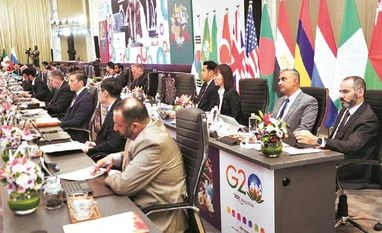The second meeting of the Anti-Corruption Working Group (ACWG) under India’s G20 Presidency, with a focus on international cooperation, innovations in anti-corruption technologies, and India’s continued efforts to bring fugitive economic offenders to justice, kick started in Narendra Nagar, Uttarakhand on Thursday.
In a press conference, Union Minister of State for Defence and Tourism, Ajay Bhatt, said that the ideas emanating from the meeting will be shared with the larger international community to help in the global fight against corruption. Within this larger goal, the minister stressed the strengthening of ties between each member nation’s auditory bodies and building a more closely connected ecosystem of cooperation between these bodies. For this, Bhatt suggested sharing of technological innovations within the G20 members and with other nations too.
Most importantly though, Bhatt said, the ongoing G20 anti-corruption meetings will also be a continuation of Prime Minister Narendra Modi’s nine-point agenda for action against fugitive economic offenders, which he had presented during Argentina’s G20 presidency in 2018. The current sessions will build upon PM Modi’s call for strong and active cooperation across G20 countries in legal processes and mechanisms to deny a safe-haven to all fugitive economic offenders, and establishing international cooperation for timely and comprehensive exchange of information, along with the formulation of a standard definition of fugitive economic offenders.
However, experts like Arun Kumar, former professor of economics at the Jawaharlal Nehru University, and author of several books on black economy, point out that the question of black economy is a wider phenomenon than corruption. While corruption is about the quid-pro-quo transaction, the black economy is rooted in illegality, he points out. “The question of the black economy is a political-economy question as it involves a triad of corrupt politicians, businessmen, and executives. We, therefore, need a much more thorough and systemic approach to countering this global phenomenon.”
Kumar also points out that the international financial architecture is in fact at the root of propagating the black economy, with nations like the UK and the US failing to curb the tax havens within their jurisdiction. “As long as these tax havens continue to exist, any efforts from developing economies will fall short of accomplishing the desired goals.”
Gender and corruption
Also Read
The second ACWG also featured a side event with a focus on gender and corruption, held on Thursday evening. The event featured a keynote address from Meenakshi Lekhi, minister of state for external affairs and culture, as well as several delegates from Italy, Indonesia, and South Africa speaking on the gendered nature of corruption and its effect on women-led businesses and economies.
Rishikesh facelift
Uttarakhand’s pilgrimage capital and its surrounding localities also received a facelift in time for the meeting. For one, the route to the ACWG meetings is lined with beautiful hand-drawn murals of the state’s native flora and fauna, notable personalities, places of visit, craftwork, patterns, and more. Close to 50 groups of painters and artists were deployed in the last three-four months to paint these murals, each of which boasts of a different painting style — from traditional and regional art styles to photorealistic portraits.
The renovation drive also included the installation of new and safer vantage- and view-points, taps for drinking water straight from mountain streams, and stronger safeguards against landslides in the greater Rishikesh urban region.
)